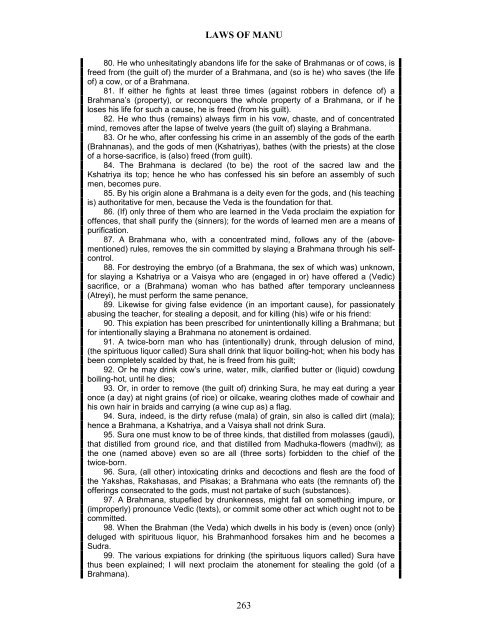Create successful ePaper yourself
Turn your PDF publications into a flip-book with our unique Google optimized e-Paper software.
LAWS OF MANU<br />
80. He who unhesitatingly abandons life for the sake of Brahmanas or of cows, is<br />
freed from (the guilt of) the murder of a Brahmana, and (so is he) who saves (the life<br />
of) a cow, or of a Brahmana.<br />
81. If either he fights at least three times (against robbers in defence of) a<br />
Brahmana’s (property), or reconquers the whole property of a Brahmana, or if he<br />
loses his life for such a cause, he is freed (from his guilt).<br />
82. He who thus (remains) always firm in his vow, chaste, and of concentrated<br />
mind, removes after the lapse of twelve years (the guilt of) slaying a Brahmana.<br />
83. Or he who, after confessing his crime in an assembly of the gods of the earth<br />
(Brahnanas), and the gods of men (Kshatriyas), bathes (with the priests) at the close<br />
of a horse-sacrifice, is (also) freed (from guilt).<br />
84. The Brahmana is declared (to be) the root of the sacred law and the<br />
Kshatriya its top; hence he who has confessed his sin before an assembly of such<br />
men, becomes pure.<br />
85. By his origin alone a Brahmana is a deity even for the gods, and (his teaching<br />
is) authoritative for men, because the Veda is the foundation for that.<br />
86. (If) only three of them who are learned in the Veda proclaim the expiation for<br />
offences, that shall purify the (sinners); for the words of learned men are a means of<br />
purification.<br />
87. A Brahmana who, with a concentrated mind, follows any of the (abovementioned)<br />
rules, removes the sin committed by slaying a Brahmana through his selfcontrol.<br />
88. For destroying the embryo (of a Brahmana, the sex of which was) unknown,<br />
for slaying a Kshatriya or a Vaisya who are (engaged in or) have offered a (Vedic)<br />
sacrifice, or a (Brahmana) woman who has bathed after temporary uncleanness<br />
(Atreyi), he must perform the same penance,<br />
89. Likewise for giving false evidence (in an important cause), for passionately<br />
abusing the teacher, for stealing a deposit, and for killing (his) wife or his friend:<br />
90. This expiation has been prescribed for unintentionally killing a Brahmana; but<br />
for intentionally slaying a Brahmana no atonement is ordained.<br />
91. A twice-born man who has (intentionally) drunk, through delusion of mind,<br />
(the spirituous liquor called) Sura shall drink that liquor boiling-hot; when his body has<br />
been completely scalded by that, he is freed from his guilt;<br />
92. Or he may drink cow’s urine, water, milk, clarified butter or (liquid) cowdung<br />
boiling-hot, until he dies;<br />
93. Or, in order to remove (the guilt of) drinking Sura, he may eat during a year<br />
once (a day) at night grains (of rice) or oilcake, wearing clothes made of cowhair and<br />
his own hair in braids and carrying (a wine cup as) a flag.<br />
94. Sura, indeed, is the dirty refuse (mala) of grain, sin also is called dirt (mala);<br />
hence a Brahmana, a Kshatriya, and a Vaisya shall not drink Sura.<br />
95. Sura one must know to be of three kinds, that distilled from molasses (gaudi),<br />
that distilled from ground rice, and that distilled from Madhuka-flowers (madhvi); as<br />
the one (named above) even so are all (three sorts) forbidden to the chief of the<br />
twice-born.<br />
96. Sura, (all other) intoxicating drinks and decoctions and flesh are the food of<br />
the Yakshas, Rakshasas, and Pisakas; a Brahmana who eats (the remnants of) the<br />
offerings consecrated to the gods, must not partake of such (substances).<br />
97. A Brahmana, stupefied by drunkenness, might fall on something impure, or<br />
(improperly) pronounce Vedic (texts), or commit some other act which ought not to be<br />
committed.<br />
98. When the Brahman (the Veda) which dwells in his body is (even) once (only)<br />
deluged with spirituous liquor, his Brahmanhood forsakes him and he becomes a<br />
Sudra.<br />
99. The various expiations for drinking (the spirituous liquors called) Sura have<br />
thus been explained; I will next proclaim the atonement for stealing the gold (of a<br />
Brahmana).<br />
263


















